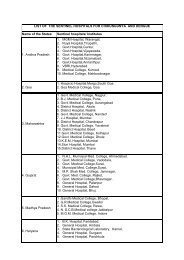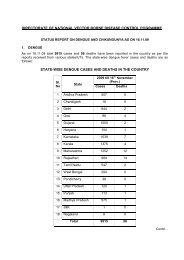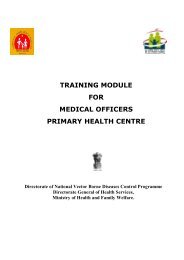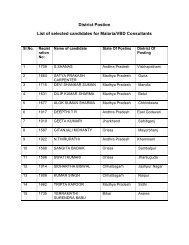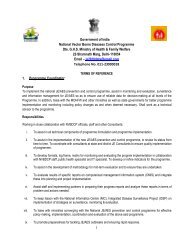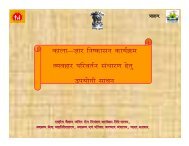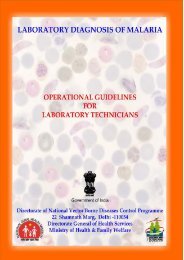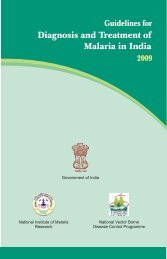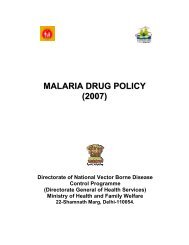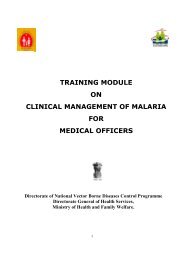National Project Implementation Plan - NVBDCP
National Project Implementation Plan - NVBDCP
National Project Implementation Plan - NVBDCP
Create successful ePaper yourself
Turn your PDF publications into a flip-book with our unique Google optimized e-Paper software.
4. Behavior Change Communication<br />
A three pronged BCC strategy is proposed for the NVBDC program: This<br />
includes: (a) decentralized BCC activities financed by <strong>NVBDCP</strong>; (b) central<br />
BCC activities implemented by a professional media agency to be financed<br />
by the project; and (c) social mobilization activities with specific focus on<br />
promoting LLINs to be implemented by NGOs or social marketing agencies<br />
having strong field presence financed by the project. The decentralized<br />
locale specific BCC activities are detailed in the operational guide for antimalaria<br />
month campaign. This PIP provides a clear roadmap for initiating<br />
and implementing structural and institutional framework for implementation<br />
as well as institutional arrangements and monitoring and evaluation<br />
processes along with a budget template. However, random state visits<br />
undertaken during the project preparation suggest that the implementation<br />
capacities across the states vary widely. The project will provide consultant<br />
support at state and national levels and the primary focus will be on<br />
interpersonal communication and group discussions to inform community<br />
based institutions like Panchayat Raj and self help groups, and vulnerable<br />
populations about new diagnostic and treatment services made available at<br />
village level. A professional media agency will be selected following QCBS<br />
process at national level to undertake formative research, develop and pretest<br />
multi-media campaign and undertake media buying for a nation-wide<br />
campaign with strong focus on endemic states. The project also provides for<br />
hiring Services of NGOs and social marketing agencies having strong field<br />
presence will be used to undertake social mobilization of beneficiaries in<br />
villages selected for LLIN intervention.<br />
5. Training<br />
The focus will be on competency based and inclusive training. The program<br />
has well defined operational guidelines for each cadre of staff and a well<br />
defined training plan supported by clear operational guidelines. Under the<br />
project additional consultant support for training has been provided at<br />
national and state levels to ensure effective planning and oversight for<br />
decentralized training activities. <strong>National</strong> & State trainers for malaria and<br />
Kala-azar have been trained at Bhubaneswar (Orissa) and Patna (Bihar)<br />
during December 2007 and early part of 2008 by a team of experienced<br />
national and international experts and this opportunity has been used to<br />
update the training modules. The national, state trainers in addition to<br />
training the core vertical contractual staff proposed under the project (such<br />
as malaria and Kala-azar technical supervisors and the district VBD officer<br />
and consultant) will also monitor the quality of training. One dedicated<br />
<strong>NVBDCP</strong> focal point has been identified for each project state who will be<br />
regularly visiting the state to provide technical oversight for decentralized<br />
activities and for trouble shooting. Further, an independent agency will be<br />
monitoring the physical progress of decentralized training including<br />
compliance with the program guidelines. The proposed early<br />
implementation review by the World Bank (after 18-21 months) will also<br />
assess the competencies of the staff at different levels.<br />
29



